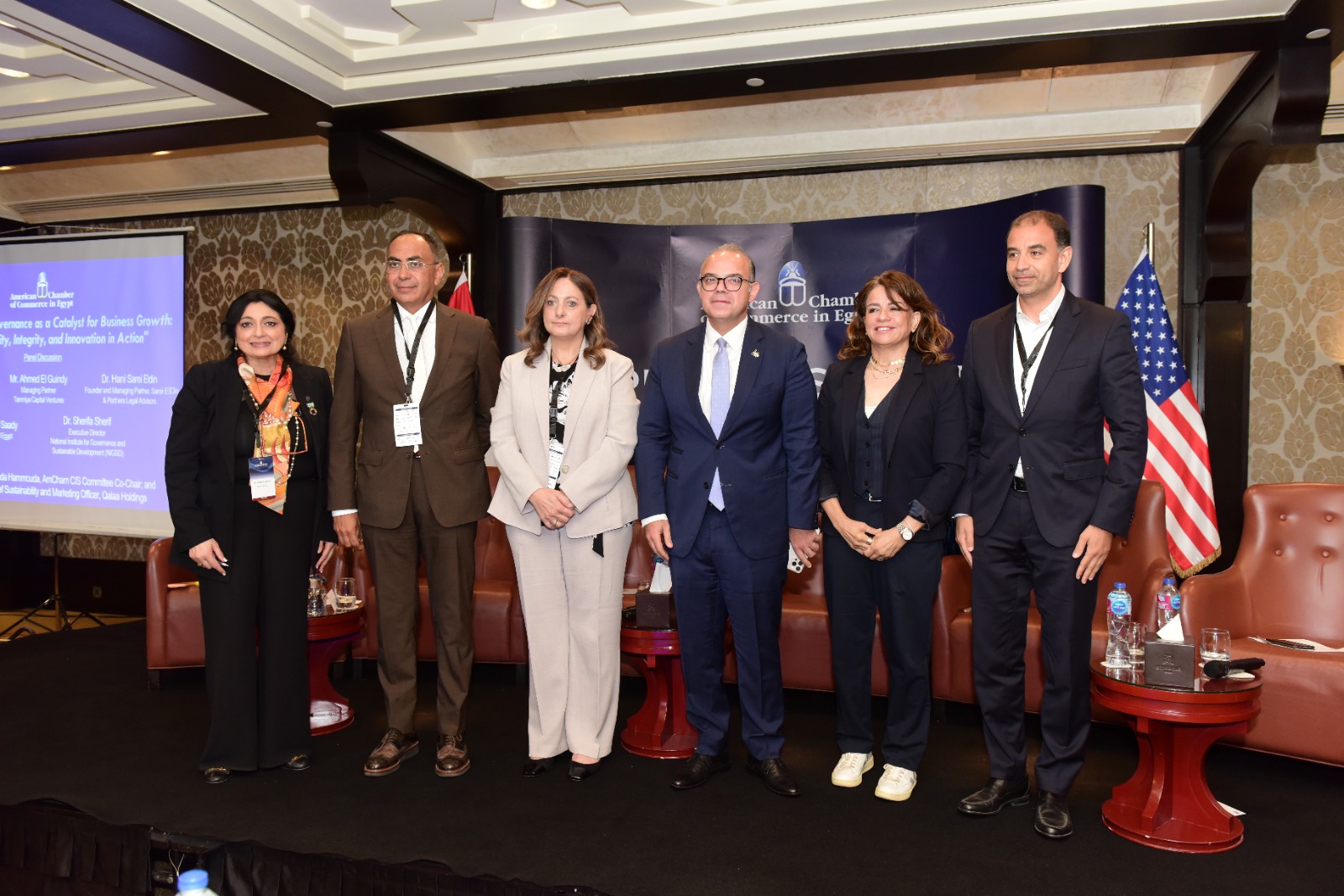Dr. Mohamed Farid – FRA Chairman:
- Corporate governance is a fundamental pillar for business growth and sustainability.
Dr. Mohamed Farid, FRA Chairman recently addressed a pivotal panel discussion hosted by the American Chamber of Commerce in Egypt. The session titled “Corporate Governance as a Catalyst for Business Growth,” convened a distinguished group of experts from the legal, investment and sustainable development sectors. It featured a distinguished panel including Dr. Hany Sarie-Eldin, Founder and Managing Partner of Sarie-Eldin & Partners Legal Advisors; Reem El Saady, Regional Manager for the SMEs Finance and Development Program at the European Bank for Reconstruction and Development (EBRD). In addition to Dr. Sherifa El-Sherif, Executive Director of the National Institute for Governance and Sustainable Development; and Ahmed El Gendy, Co-founder and Managing Director of Tanmeya Capital Ventures. The panel was moderated by Ghada Hammouda, Chief Sustainability and Marketing Officer at Qalaa Holdings.
Dr. Farid provided a comprehensive look at the evolution of corporate governance in Egypt, noting its framework began taking shape in 2004. This initiative, drawing heavily from OECD principles, led to the landmark issuance of Egypt’s first Corporate Governance Code in 2005, spearheaded by the Egyptian Institute of Directors.
FRA Chairman stated that corporate governance transcends mere regulatory compliance; it is a crucial strategic instrument for elevating institutional performance and fostering enduring, sustainable growth. He underscored FRA’s notable success in significantly expanding the reach of governance implementation. This expansion now extends beyond merely listed companies on the Egyptian Exchange to encompass all approximately 3,500 non-bank financial institutions under FRA’s supervision. This includes, but is not limited to, private insurance funds, microfinance companies, entities dedicated to financing small and medium-sized enterprises (SMEs), and all other stakeholders operating within the non-bank financial services landscape.
Dr. Farid asserted that FRA has taken concrete and impactful executive measures to solidify this commitment. He highlighted the mandatory requirement for female representation on company boards and the collaborative launch of a database with the American University in Cairo, which identifies qualified women for board positions. Furthermore, FRA has mandated that companies provide comprehensive Environmental, Social, and Governance (ESG) and Task Force on Climate-related Financial Disclosures (TCFD). To ensure the efficacy and integrity of these disclosures, Dr. Farid revealed that FRA is developing a unified methodology for evaluating and classifying company reports, with the overarching aim of enhancing disclosure quality and promoting greater transparency.
In a testament to FRA’s dedication to support the green economy, Dr. Farid outlined several key initiatives. These include the issuance of a clear classification system for sustainability bonds, encompassing both green bonds and transition bonds. The Authority has also established precise standards for the formation of green investment funds and has opened avenues for ESG rating agencies to commence operations within Egypt.
These collective efforts recently culminated in a significant announcement: FRA’s establishment of Egypt’s first regulated voluntary carbon market. Operating under the stringent oversight of capital market regulatory authorities, this innovative market is designed to empower carbon emission reduction projects to issue verified and certified carbon credits. These credits will then be traded on a regulated digital platform, serving as a powerful magnet for both domestic and international investors. By purchasing these credits, investors not only support climate action but also provide additional revenue streams for the implementers of these critical projects, thereby directly bolstering Egypt’s national drive towards achieving carbon neutrality.
Dr. Mohamed Farid stated that the upcoming phase will involve extensive and collaborative discussions concerning the implementation of the International Financial Reporting Standards (IFRS) Sustainability Disclosure Standards S1 and S2. Dr. Farid underscored the critical importance of adhering to the proportionality principle when applying these standards. He extended an invitation to all stakeholders, with a particular emphasis on the American Chamber of Commerce, to actively engage in shaping a comprehensive roadmap.
Last modified: July 15, 2025
